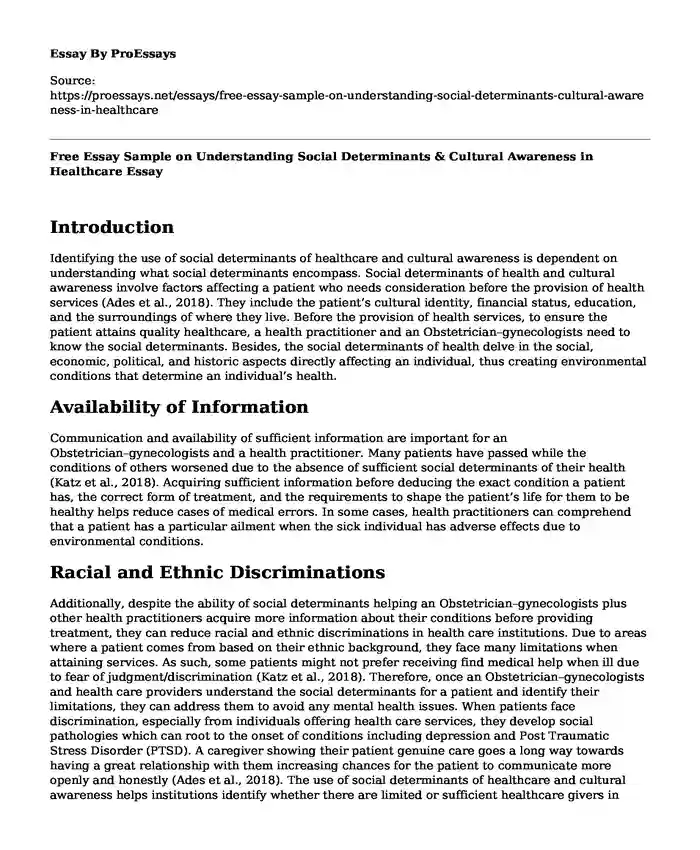Introduction
Identifying the use of social determinants of healthcare and cultural awareness is dependent on understanding what social determinants encompass. Social determinants of health and cultural awareness involve factors affecting a patient who needs consideration before the provision of health services (Ades et al., 2018). They include the patient’s cultural identity, financial status, education, and the surroundings of where they live. Before the provision of health services, to ensure the patient attains quality healthcare, a health practitioner and an Obstetrician–gynecologists need to know the social determinants. Besides, the social determinants of health delve in the social, economic, political, and historic aspects directly affecting an individual, thus creating environmental conditions that determine an individual’s health.
Availability of Information
Communication and availability of sufficient information are important for an Obstetrician–gynecologists and a health practitioner. Many patients have passed while the conditions of others worsened due to the absence of sufficient social determinants of their health (Katz et al., 2018). Acquiring sufficient information before deducing the exact condition a patient has, the correct form of treatment, and the requirements to shape the patient’s life for them to be healthy helps reduce cases of medical errors. In some cases, health practitioners can comprehend that a patient has a particular ailment when the sick individual has adverse effects due to environmental conditions.
Racial and Ethnic Discriminations
Additionally, despite the ability of social determinants helping an Obstetrician–gynecologists plus other health practitioners acquire more information about their conditions before providing treatment, they can reduce racial and ethnic discriminations in health care institutions. Due to areas where a patient comes from based on their ethnic background, they face many limitations when attaining services. As such, some patients might not prefer receiving find medical help when ill due to fear of judgment/discrimination (Katz et al., 2018). Therefore, once an Obstetrician–gynecologists and health care providers understand the social determinants for a patient and identify their limitations, they can address them to avoid any mental health issues. When patients face discrimination, especially from individuals offering health care services, they develop social pathologies which can root to the onset of conditions including depression and Post Traumatic Stress Disorder (PTSD). A caregiver showing their patient genuine care goes a long way towards having a great relationship with them increasing chances for the patient to communicate more openly and honestly (Ades et al., 2018). The use of social determinants of healthcare and cultural awareness helps institutions identify whether there are limited or sufficient healthcare givers in every department. If an institution has increased cases of dealing with immigrants, learning, and having a record about the social determinants of patients will help in the preparation and ensuring the presence of enough translating personnel.
Conclusion
Simply put, the primary use of social determinants involves improving the quality of services offered to patients. In case the surroundings of the place patients stay are unsafe, or they are homeless, knowing their social determinants helps find ways of improving their situation by communicating with social services (Ades et al., 2018). Referring patients to social services helps reduce their chances of ailing due to attaining support to satisfy their basic needs. Statistically, most poor individuals living in low socioeconomic surroundings have high chances of being sick. Due to the difficult living conditions, despite being sick, such individuals resist finding medical help since many institutions only focus on the genetics of a patient concerning their medical history. Therefore, when dealing with such individuals, instead of criticizing them once a health practitioner learns about their social determinants, the institution can educate the patients concerning ailments, their lifestyles, and the best way to living a healthier life (Katz et al., 2018). Using social determinants while providing health care services is the best was to ensure the provision of satisfactory services to every patient in an institution.
References
Ades, V., Goddard, B., Ayala, S. P., Bach, S. C., & Wu, S. X. (2018). ACOG Committee Opinion No. 729: Importance of Social Determinants of Health and Cultural Awareness in the Delivery of Reproductive Health Care. Obstetrics & Gynecology, 131(6), 1162-1163; doi: 10.1097/AOG.0000000000002459.
Katz, A., Chateau, D., Enns, J. E., Valdivia, J., Taylor, C., Walld, R., & McCulloch, S. (2018). Association of the social determinants of health with quality of primary care. The Annals of Family Medicine, 16(3), 217-224: https://doi.org/10.1370/afm.2236
Cite this page
Free Essay Sample on Understanding Social Determinants & Cultural Awareness in Healthcare. (2023, Oct 05). Retrieved from https://proessays.net/essays/free-essay-sample-on-understanding-social-determinants-cultural-awareness-in-healthcare
If you are the original author of this essay and no longer wish to have it published on the ProEssays website, please click below to request its removal:
- Student, Family, Poverty, and Schooling Essay
- Pneumonia in HIV-Infected Patients Essay Example
- Essay Example on Diagnosing Burns: Possible Health Disorders
- Essay Example on Sal's Struggle: Growing Up in a Different Family Structure
- Essay Example on Unveiling Public Health: Exploring the Role of Epidemiology
- Essay Sample on Childish Gambino's This is America: A Commentary on American Society
- Paper on Comparing US & Canadian Healthcare Systems: A Look at GDP Expenditures







